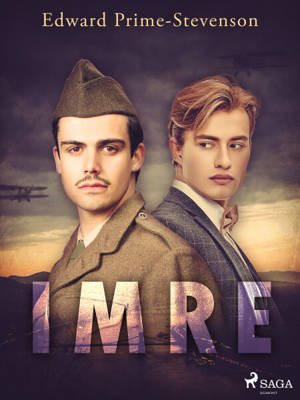
Bedankt voor het vertrouwen het afgelopen jaar! Om jou te bedanken bieden we GRATIS verzending (in België) aan op alles gedurende de hele maand januari.
- Afhalen na 1 uur in een winkel met voorraad
- In januari gratis thuislevering in België
- Ruim aanbod met 7 miljoen producten
Bedankt voor het vertrouwen het afgelopen jaar! Om jou te bedanken bieden we GRATIS verzending (in België) aan op alles gedurende de hele maand januari.
- Afhalen na 1 uur in een winkel met voorraad
- In januari gratis thuislevering in België
- Ruim aanbod met 7 miljoen producten
Zoeken
Omschrijving
It’s Budapest, early 20th century. Oswold is spending the summer at a language school, whilst Imre, a Hungarian calvary officer, is on leave. In the hustle and bustle of a café nestled deep in the city, the two men meet. As their companionship grows in the most unlikely of circumstances, their story is about to carve its own ending...
At a time when society was less than kind to the gay community, Edward Prime-Stevenson’s psychological romance weaves a beautifully unexpected tale. Written under the pseudonym of Xavier Mayne, ‘Imre’ marks a turning point in LGBTQ+ literature. The openly gay love story is perfect for fans of ‘Call Me by Your Name’ with of Timothée Chalamet.
Edward Prime-Stevenson, pseudonym of Xavier Mayne (1858-1942), was an American writer, journalist and author. Celebrated today as having written the first openly gay novel with a happy ending, his work spans early YA novels such as ‘The White Cockades: An Incident in the "Forty-five"' and ‘Left to Themselves: Being the Ordeal of Philip and Gerald.’ In 1908, Prime-Stevenson published the nonfiction book ‘The Intersexes’; a comprehensive analysis and defence of homosexuality to date. Today, he is remembered as having marked a turning point in English literature and remains an outstanding observer of the early 20th century LGBT scene.
At a time when society was less than kind to the gay community, Edward Prime-Stevenson’s psychological romance weaves a beautifully unexpected tale. Written under the pseudonym of Xavier Mayne, ‘Imre’ marks a turning point in LGBTQ+ literature. The openly gay love story is perfect for fans of ‘Call Me by Your Name’ with of Timothée Chalamet.
Edward Prime-Stevenson, pseudonym of Xavier Mayne (1858-1942), was an American writer, journalist and author. Celebrated today as having written the first openly gay novel with a happy ending, his work spans early YA novels such as ‘The White Cockades: An Incident in the "Forty-five"' and ‘Left to Themselves: Being the Ordeal of Philip and Gerald.’ In 1908, Prime-Stevenson published the nonfiction book ‘The Intersexes’; a comprehensive analysis and defence of homosexuality to date. Today, he is remembered as having marked a turning point in English literature and remains an outstanding observer of the early 20th century LGBT scene.
Specificaties
Betrokkenen
- Auteur(s):
- Uitgeverij:
Inhoud
- Aantal bladzijden:
- 57
- Taal:
- Engels
Eigenschappen
- Productcode (EAN):
- 9788728258279
- Verschijningsdatum:
- 19/07/2022
- Uitvoering:
- E-book
- Beveiligd met:
- Digital watermarking
- Formaat:
- ePub

Alleen bij Standaard Boekhandel
+ 1 punten op je klantenkaart van Standaard Boekhandel
Beoordelingen
We publiceren alleen reviews die voldoen aan de voorwaarden voor reviews. Bekijk onze voorwaarden voor reviews.









